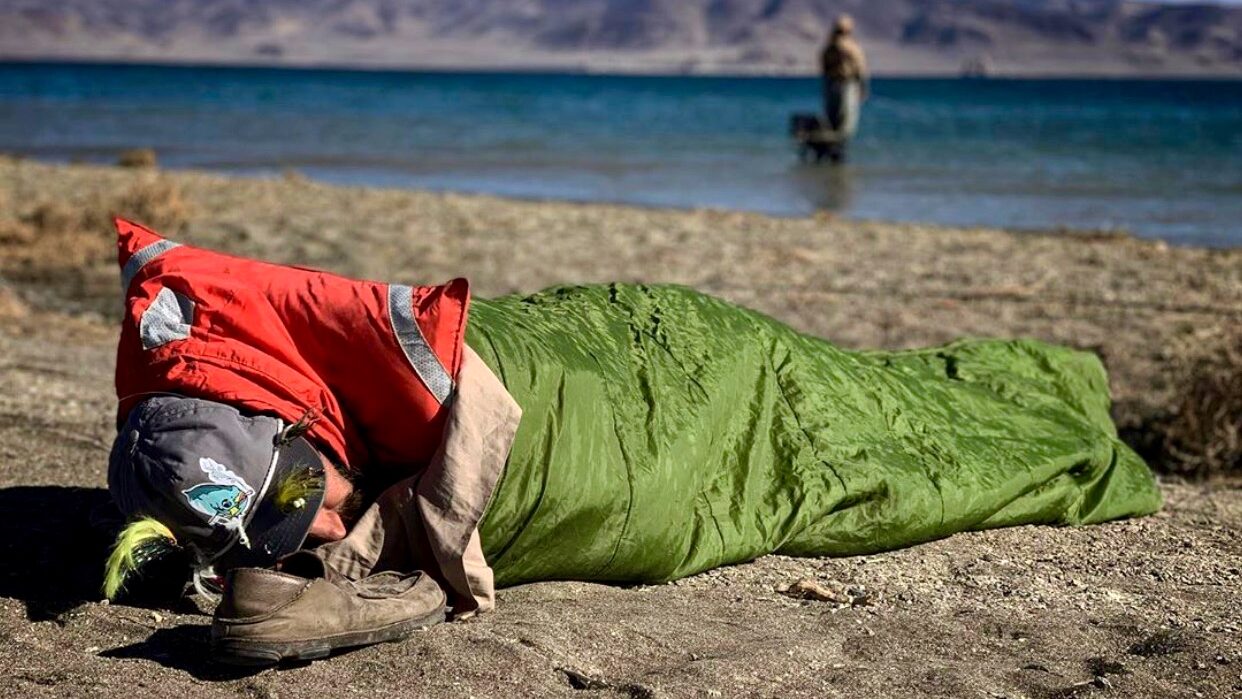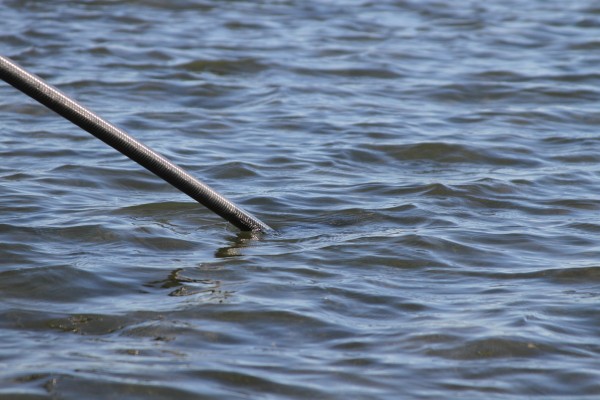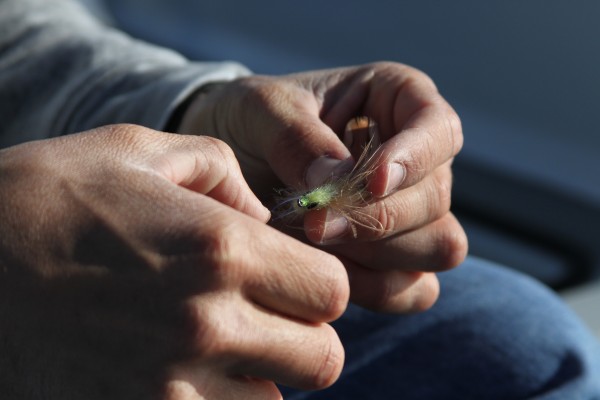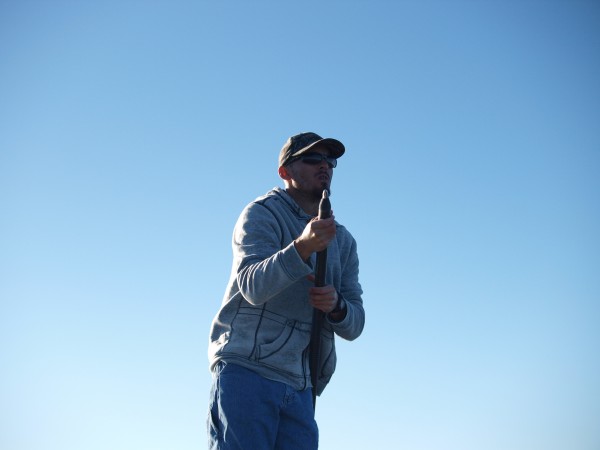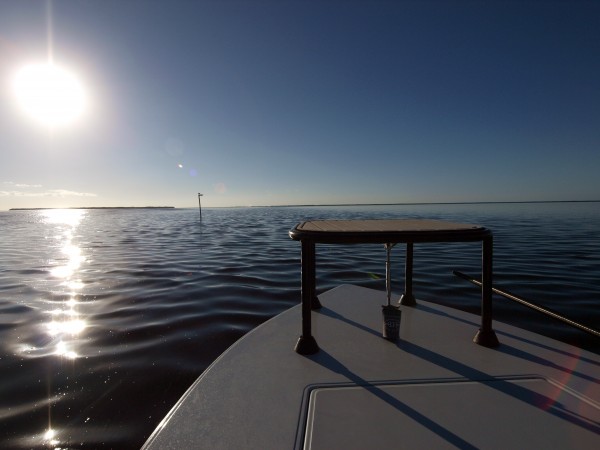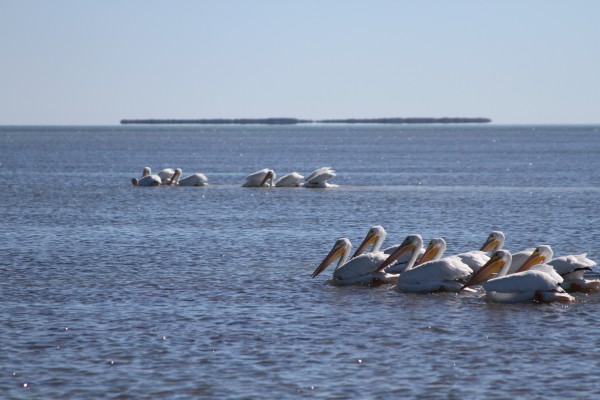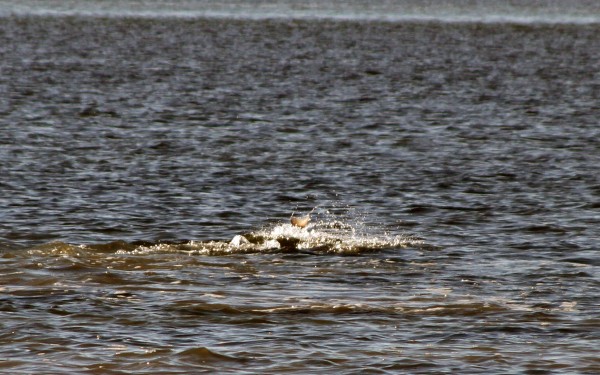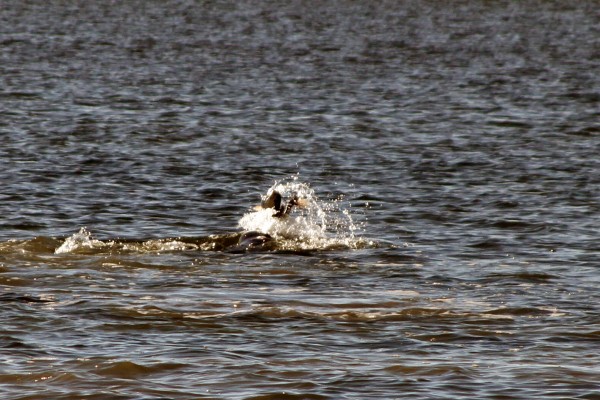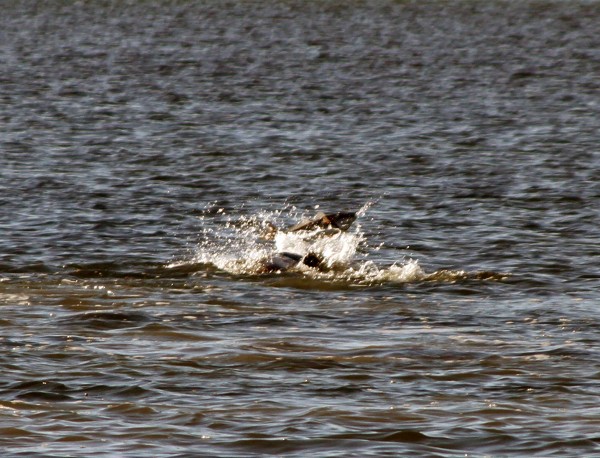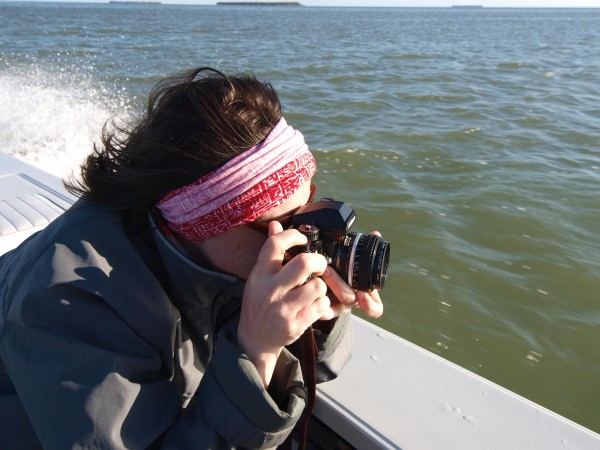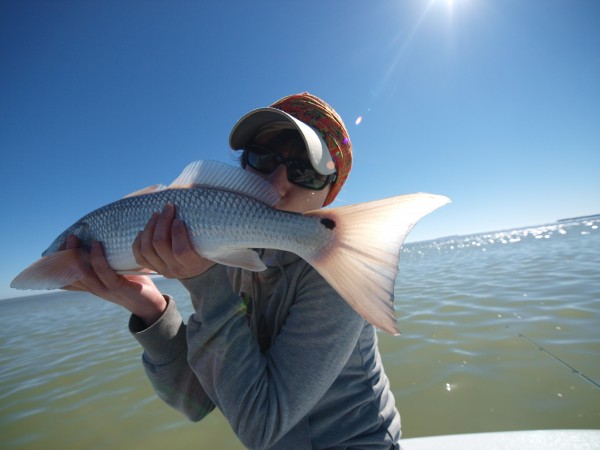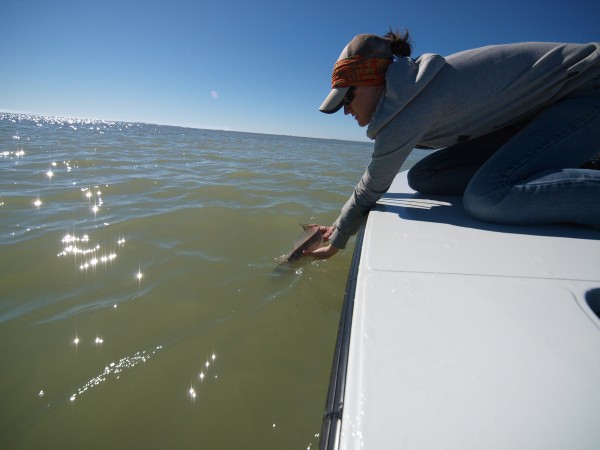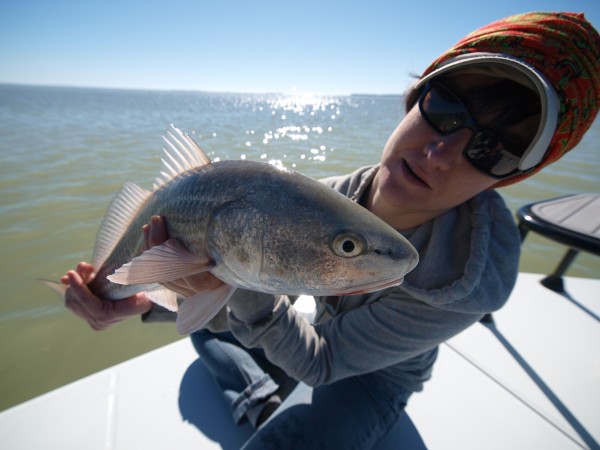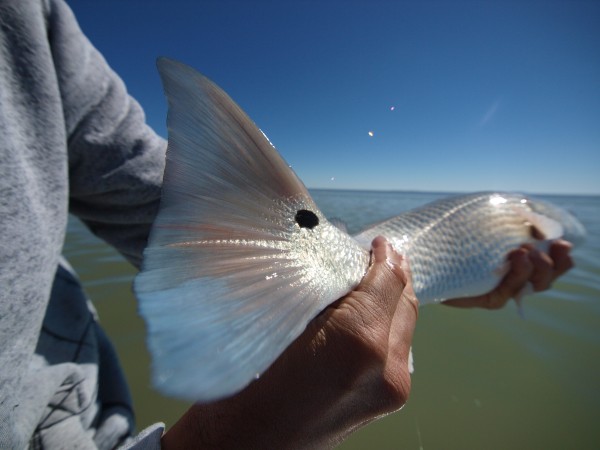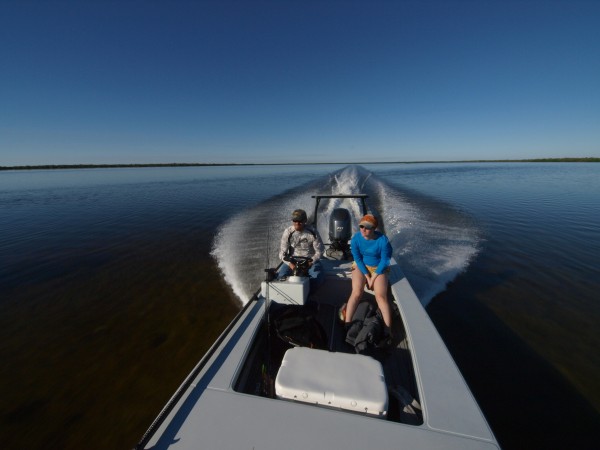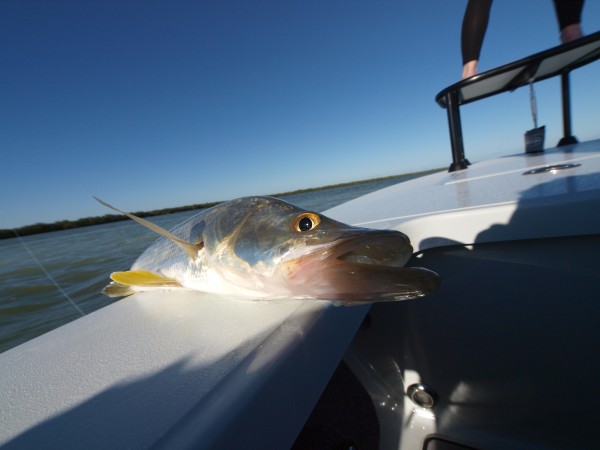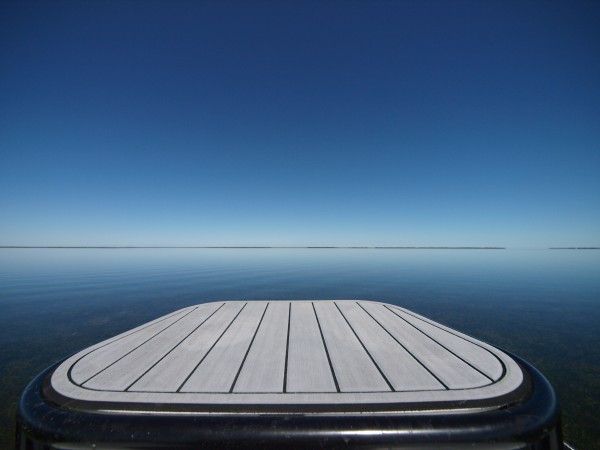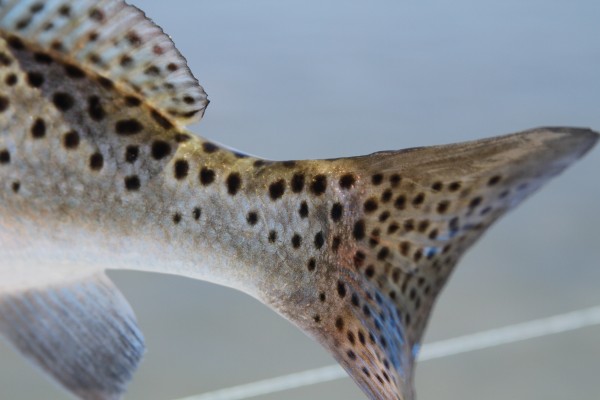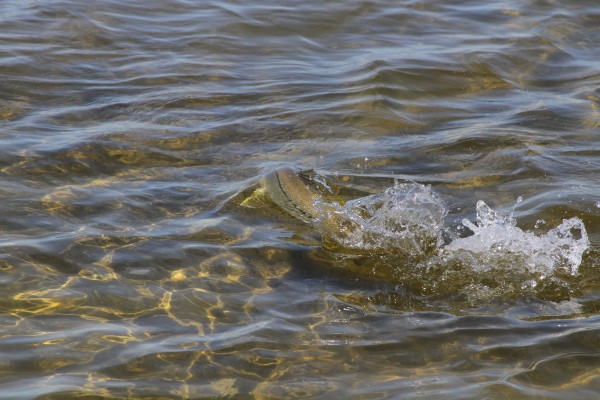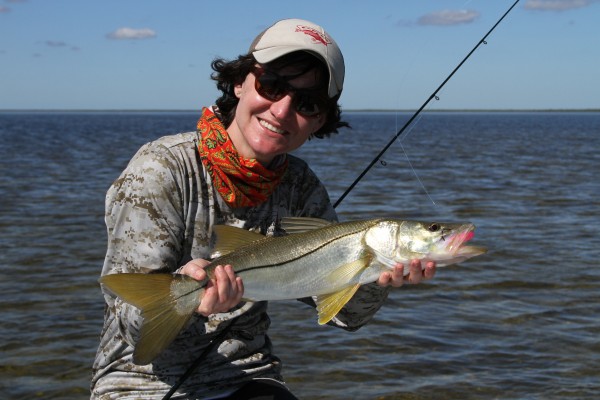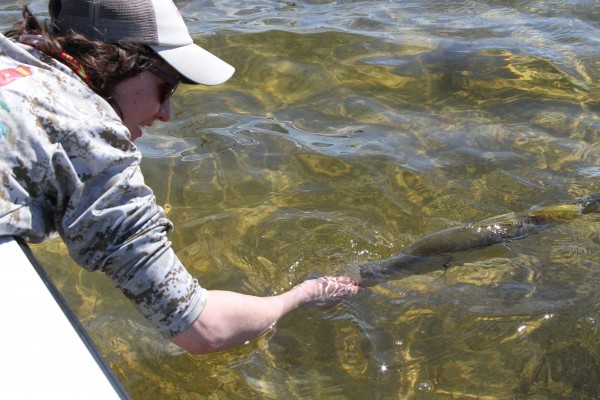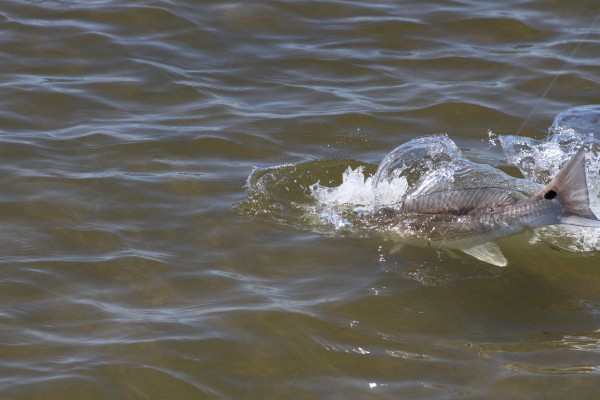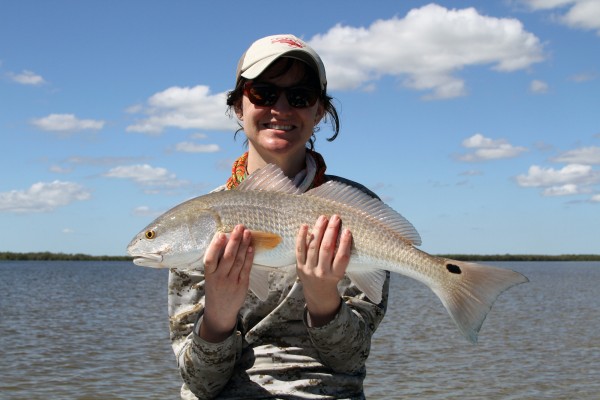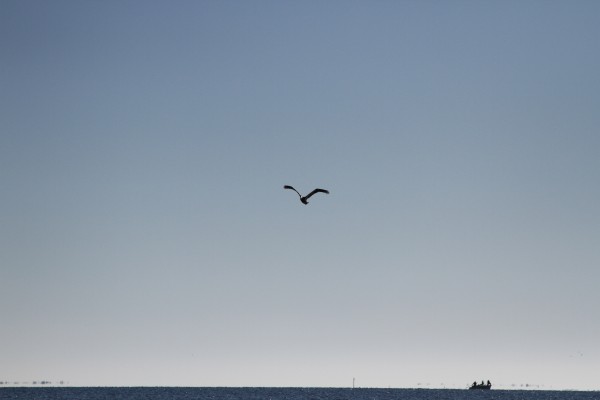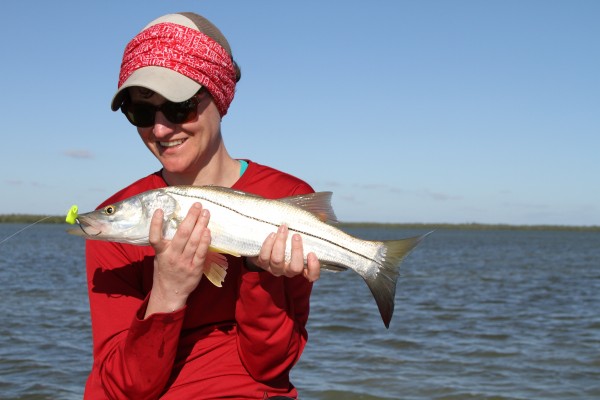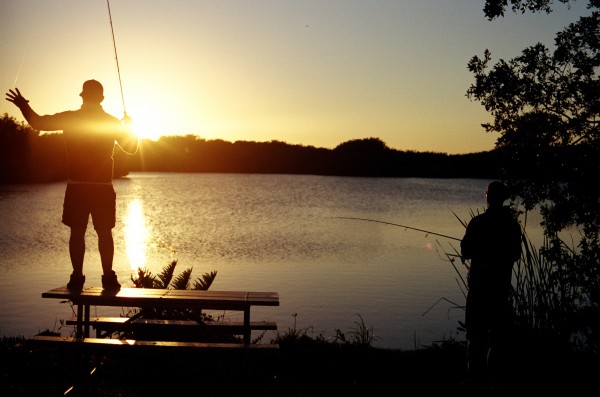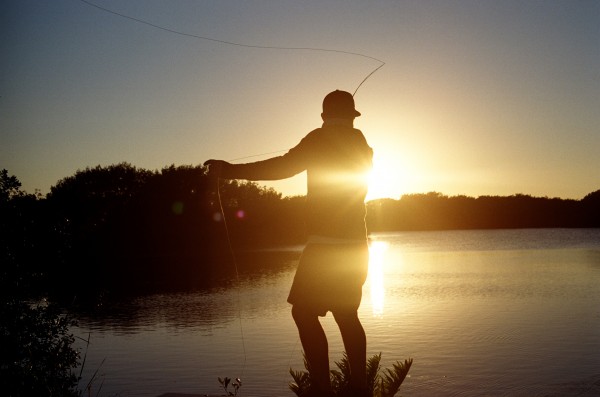It was the third redfish we had seen since poling up onto the flat. Selfsame as the last two. Oversized and broad across the shoulders and neck where the small brassy scales ran around its collar and met the wide smooth cap at the base of its skull.
The first fish that we had come upon in the cloudless bright of that late morning had been sighted from the casting deck. Crawling along at a distance of three of four very long shots and its back so dark that I almost didn’t call the fish. Such was the resemblance to the occasional small sharks that slither amongst the potholed paddocks of Thalassia testudinum. But I did call it. And when Tejera put me in range I laid down a cast that landed the fly less than a foot in front of fish. Strip. Strip. She kept swimming. Another cast succeeded in landing the fly inches from the fish as well as in drawing no response.
I pulled the fly, tied with the hackles of a quail shot by Tejera only months before, from the water. Drew the dun fur and calico feathers between my fingers. Slight tension in the rachis of each as they were pulled straight against their natural wind. I stared over the hookeye down the length of the fly. Downy symmetry faithful and intact. Small prisms animate in the walled and peering adhesive eyes. I rolled the fly back into the water and steered it amongst the wavelets hastening along the length of the skiff. Truth in its swimming.
The second fish was bigger. A betting man would have called it fifteen pounds. More. Tejera had slowly been brining the bow about. As the skiff came to the end of its turning a pane of glare that had been riding our shoulder from nine to eleven o’clock evaporated. Tejera had eyes on the fish immediately. Laid up on the edge of a pothole and facing to the left. The pale of its wide belly visible where it rode up the flanks of the fish in epaulets of sterling and pearl. At less than 30 feet it was a quick shot to get off against a fish that size. The loop unfurled and the fly fell on the mark. Short, quick strips had the fly scooting just before the nose of the fish. In an eruption of mud the fish broke from her calm. Speeding away from the fly in search of respite from the odd, gangling intruders that had thrown it at her, the fish pushed a deep wake across the flat as it raced towards Islamorada.
Before we poled up to fish number three enough time had passed to allow for a few small combers of doubt to roll in and wash over me. A little something against which to hone my resolve as another hundred feet of flat passed beneath the prow of the Hell’s Bay.
Tejera called the third fish and eased the skiff into position. About forty-five feet. Just to the right of twelve o’clock and laid up. Facing us. The muscled architecture of the redfish perfectly still and blushing pale and florid beneath the near noon sun as if it had been hewn from orthoclase and left to stand eternal sentry in the faultless shallows of Florida Bay. I started the line gently, measuring distance to the fish on the forestroke. Another false cast. I let the shot go and found a mark just left of where I wanted it. I picked up the cast and loaded the rod and came forward again. The fly alighted in silence, on line and just before the fish.
I stripped the fly. The redfish rose to the surface of the scant water column. I stripped again and the fly pulsed. The redfish began to advance. Heavy tail sweeping faster. Faster. The bell of water rising before its snout at once growing taller and deeper. Another strip and the redfish charged the fly. I bumped the fly a last time. The redfish breached in slight profile. Head and shoulders heaved above the waterline with jaws flared. Eye wild and sharp as it dialed on its mark. Short and flat, the crack of the redfish dismissing the fly sounded off and drifted away downwind and was gone.
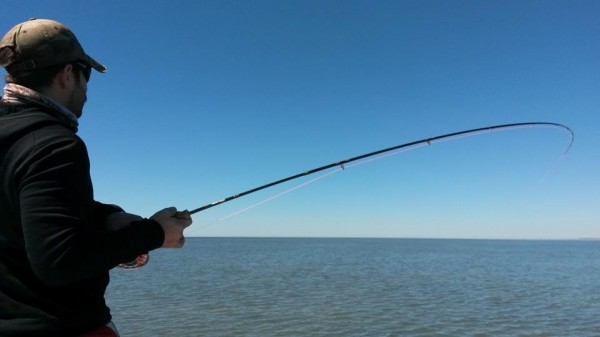
The redfish wheeled and hared off towards the edge of the flat and the distant brink of pale blue horizon. The fly line hissed through the guides as it chased after the redfish. Without a single hitch in its gait the redfish kept speeding. What remained of the floating line cleared the top guide of the fly rod. The high buzzing of the drag as the neon dacron fell from the reel and veered away into the shallows of Florida Bay.
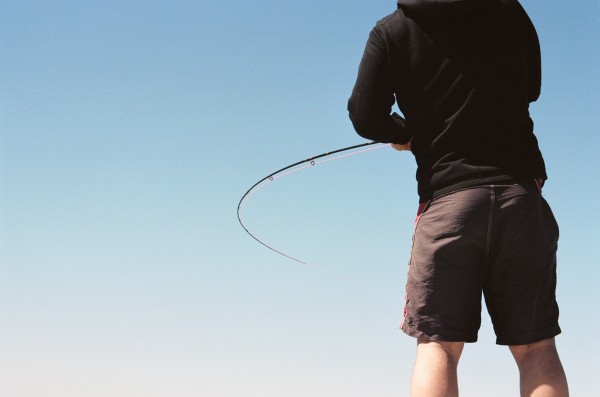
Still the fish kept on, running more and more backing from the reel. When it did stop, the redfish swung its heavy skull and thickset shoulders and slashed its blue quilled tail against the turtle grass in a violent lather of foam and mud that set the water to quaking. Again the fish began to take line. Slower this time. The fish leveraging its weight to drag out a few feet and then a few more. The two of us kept at it. Slowly I began to win line back onto the reel.
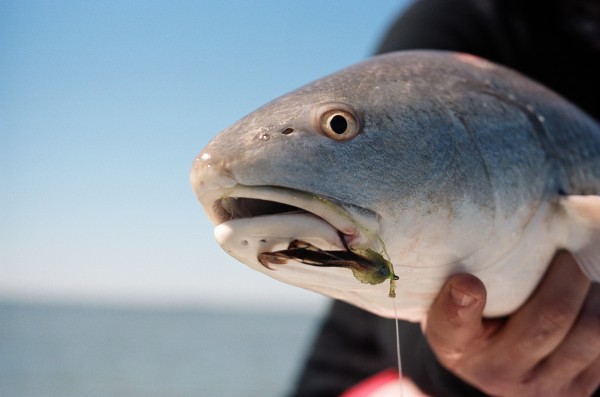
When the fish came boatside Tejera caught her by the tail. He slid another hand up under her belly and passed her up to me. The saline bouquet of the tide and mucous carrying faint and sweet from the fish, heavy in my hands. After few quick pops of the camera shutter I stepped off the platform and onto gunnel before sliding over the side with the fish still in my hands. February cold front be damned.
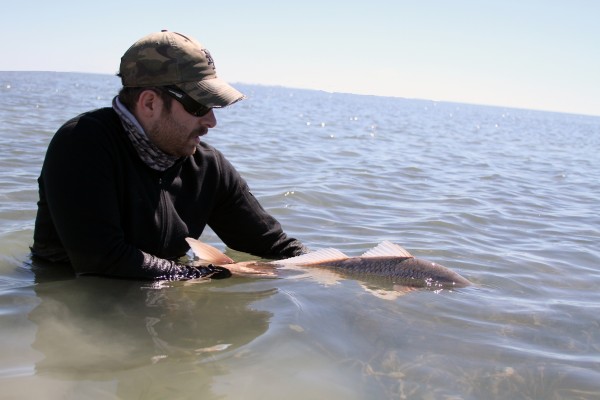
Swallowed to the knees in the quaggy substrate of Florida Bay I cradled the fish. Letting the cool, oxygen rich water flood her gills as she regained what she had given up in the fight. The gill plates silvered and bony working steadily as tide pushed across them. It didn’t take long. Her tail began to weave more purposefully. Her shoulders hunting back and forth with a slow, practiced ease. Fins pricking and reaching. She was strong. Ready.
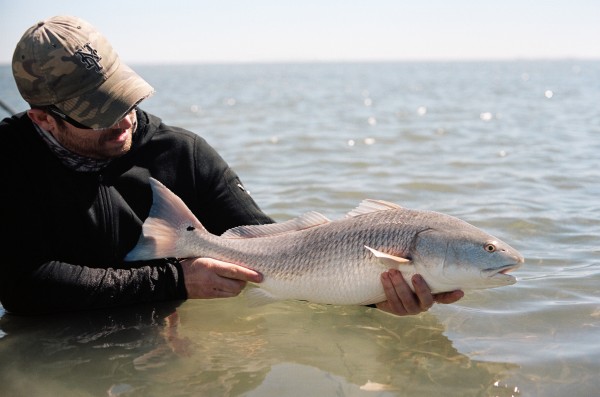
I drew her from the water once more. A final opportunity for admiration. The sun sparked and fired where it caught in the faintly coppered scales along the muscled bulk of her back and shoulders. Tail a deeper blue than it had been when we first came upon her, and hueing deeper still. Her mouth and fins working. And her eyes, golden and faultless, searching in their sockets to reclaim the familiar sights of the submarine.
I put her back. She kicked hard and kicked again to quit my grip. Body switching quickly, she shot off to the west. The turtle grass parting before her as she swam as though it were caught in a wind.
Now. Put that into a word.
*
Twenty four hours before I was planked over the side of Tejera’s skiff, swimming from my feet the rich and slippery benthic compost dredged from the bottom of Florida Bay, I was in Queens watching snow fall. Blowing in at acute angles to the earth, globular wads on the new snow shuttled on the wind like unbroken heads of dandelion seed carried away and aloft out of some distant and dead meadow. The totality of the sky wiped in grey. A pane of low clouds that just went. Vanguard of the second winter storm to sweep the northeast in almost as many days. Another fucking travel nightmare looming in the scuffed cafeteria linoleum, the gentle and almost imperceptible tremor of the flourescent lights above and the quiet and diverted eyes of the other travelers. Running over newsprint with the secret hope that if they kept their attentions diverted from the winter swifting and whirling before the windows overlooking the taxi-way that catastrophe would spare them. Some had been there for a few days. The dull gloss of unwashed hair and denim jeans bellying where the knees had worked too many days in a row told the story. As for Nicki and I, it seemed as though we were on the cusp of another cancellation. I could feel the heavy suck of disappointment beginning to creep in at the edges. Again.
Five weeks earlier we’d been slated to fly down to New Orleans and take up a three-day hunt outsize redfish with our friend Capt. Greg Dini in the Louisiana marsh. Our flight to New Orleans was cancelled an hour before it was scheduled to depart. The earliest rebooking we were offered was four days later. The day we were supposed to fly back to New York. That trip had been on the book for over half a year. It was a bad beat. A lot of time and money evaporated right then and there, when cancelled flashed across the Departure screen. Even worse than those measurable things that were lost, casualties of airports and airlines unable to prepare for and handle their weather, was the one intangible that was also paid in forfeit. Opportunity. To catch fish. To be on the water. To share time with people you care about. Even with no way to know how good or bad the fishing would have been, it didn’t matter. Just the chance to find out is paramount above all else.
For Nicki it would have been her first time on the water in six months. For me it would have three months. Far too long on both counts.
We regrouped. February was only a month away. If south Florida temperatures maintained the pleasant and agreeable levels at which they had been for much of the winter, the tarpon might already be swimming by the time we arrived. Redfish and snook would be climbing out of the channels and creeks and into the crystal betrayal of shallow flats and slicked out bightwater. Throw a few dozen feet worth of loosely coiled triangle taper on the casting deck and all would be right with the world.
There was still hope.
At ten days out from our date of departure, weather reports for a pair of impending winter storms began to occupy forecast headlines. The first storm, scheduled to exact its icy weather on the east coast thirty-six hours before we were to fly, would sweep up from the south, turning the bucolic landscapes of the Carolinas and Georgia, and more specifically Atlanta, city through which our flight would have to connect, into frozen wastelands, before continuing on and dumping more snow on the Northeast. The second storm was scheduled to arrive in New York on the day of our departure and drop five to eight inches before sliding into New England and pumping out nearly a foot or more of snow. And there was no clear picture of whether or not our departure time would fall in that sweet spot of calm, reasonable weather between the storms. Most major weather outlets were more concerned with offering absurd, sensationalist headlines to match the storm than providing actual details of when the weather might arrive.
So, as the first dusting of that second mid-February storm-swept the airfield at LaGuardia, with another six inches in tow predicted, the elevated heart rate and spikes of adrenaline that set me pacing along the edge of the boarding gate and chanting to myself, in a not-so-quiet whisper, the various expletives and chaotic verbage of an entirely secular prayer did not seem to be anything less than absolutely necessary. Eyes had begun to rise from behind magazines and newspapers. So what.
The madness. The paranoia. All over things that we cannot control despite the concerted and ongoing efforts of our entire species ever since that first day when eyes were turned up into rain or snow or wind, and someone more furry and hunched than us thought, “well fuck me. This weather sucks.” And it is all compounded when you’re forced to fret over it before a ferrule ever gets connected or a leader ever gets tied. Being at the mercy of air travel is a lot like playing flinch when you’re ten. You get hit once, but you never want to get hit again. So you twitch a little bit when it looks like that meteorological fist is sailing at you once more. Because at the end of it all, the severity of the delay or interruption or catastrophe is moot. All that matters is can you fish. Or not.
Even as we began boarding the aircraft I had that in mind. I still felt justified in my worry. What a small trouble it would have been for them to just take us off of the plane. Hell, even with the flight crew shellacking the fuselage of the jet with the gastric brown de-icing fluid I still wasn’t convinced. But my misgivings were all for naught and eventually we were airborne along a southerly tack.

And even after a slight delay kept us a while longer drinking beer in the small regional terminal of Hartsfield-Jackson, we were lined up to board our connecting flight out of Atlanta. Less an airport than a sprawling, dangerous ice sheet two days prior, our plane waited beneath a cloudless blue sky and before clear runways. Given the rather pretty appearance of that southern afternoon it seemed safe assume that we were finally removed from the possibility of any further air travel woe.

Our aircraft came to rest at the very last gate of the D Terminal at Miami international. As far away from the main terminal as you can be. We deplaned through an open-air jetway and moved across the tarmac. Behind us the sun had sloughed off beneath the western horizon. Leaving behind a hot, candecsing skin of molten evening light. The sky was cloudless. The air still and warm. Our opportunity had at last returned.
*
The lamentable weather we had been able to abandon. However, the cold, or at least a chill relative to that from whence we had just come, had followed us. Or rather we followed it. The arctic air, shepherd of ice and doom that swept the Southern states only a few days before had continued to press its way south and when we arrived in Flamingo the next morning the air temperature was hovering just below fifty degrees. While this cool temperature posed a marginal threat to the demeanor of the snook and redfish we would be in pursuit of, it would be more than enough to shut the early season tarpon, possessed of a sensitivity that even pre-teens and early adolescents would find remarkable, down for at least a day. Fine. We had two more days for the weather to warm to aid in our hunt for silver.
While megalops loitered in the deep of channels or meandered back offshore to weather the onset of winter air, the rest of Florida Bay stirred. Squadrons of white pelicans, the full regalia of their snowy plummage and mandarin beaks on display under the late winter sun, cavorted at edges of every flat we passed on our way. A practiced and reserved elegance in the smooth extension of their necks. Beaks caverned as they reached below the water to scoop forage fish from the tide. A far cry from the reckless histrionics of their southern cousins.
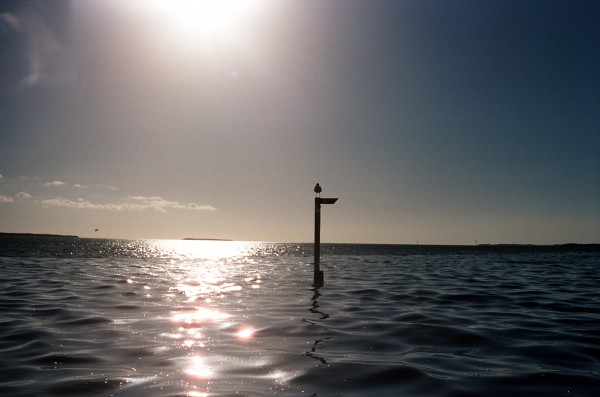
Resident fowl obliged us as well. Osprey’s winging away to the south. Where mangrove keys dim and distorted by distance into thin rags of color twisting in the convections awaited them. The trajectory of each raptor yo-yoing just so with the weight of a fresh payload. Still frantic in their swimming. And the gulls. Taciturn totems crouched and vigilant atop the pylons staking out the boundaries of Tin Can Channel.
Beyond the channel, a pair of porpoise crowded shoals of mullet against the shallow steppe at the foot of a flat. The dark cetaceans turning onto their sides and speeding muddy circuits around the mullet. The mounting confusion of the small prey evident as they leapt and spun through the air in search of amnesty. Deeper into the interior of the same grassy shelf another steep head wake with, tall, mammalian dorsal fin in tow carved across the flat. The familiar penny red tail of its quarry kicking hard and throwing minor sheets of water airborne as it careened through hard turns in its fleeing.
Cannonading and the roar of flying water echoed off towards the mainland as the porpoise barreled through turns, collapsing the distance. In a rush of spray the redfish went airborne. Skipping easily across the surface despite the bulk and oblong shape of its body. Again the redfish took to the air in a wild contortion of its linear frame. There was a final push of water and a calm fell over the scene . Save a few rings of foam washing gently as they settled. The black dorsal marking an eastbound path off the flat. Great seeps of the stirred and still billowing mud disfiguring the shallows. We put the death at our backs and kept moving.
*
“I won’t be good at it anymore.”
This was a common refrain in our house during the weeks leading up to our departure for the Everglades. Every time the subject of fishing was broached, Nicki was quick to voice her general distrust of the angling skills she had acquired over the past couple years, and more importantly, that her muscle memory would betray her when the time to cast was at hand and fail to recall the necessary motions required to operate a spinning rod. For a time I was willing to entertain her rhetoric. Assuring her that she would be fine and that given the short amount of time that she has been fishing, that she is actually pretty good. That she would catch fish. Many of them and good ones. She wouldn’t hear of it. She was going to be terrible.
So, one day I agreed with her.
“It’s unfortunate that you’re going to suck”, I said. “It’s going to be a long three days if you’re gonna blow shots and miss fish the whole time.”
Her eyes narrowed and she wouldn’t take them off of me. The smile she had been wearing flattened. She took a slow, deep breath and turned her back to me and walked out of the apartment. Not a word uttered. I was worried there wouldn’t be any coffee for me when she returned.
I suppose it is a good test of conviction for any angler. Aspiring or established. Question their ability. Casual retorts and snark offered in response to the questioning often denote those unwilling to pour enough into the common to realize that they must always be working towards getting better. That they aren’t the best. Those who regard you quietly and in a such a way that they might level a right cross at your snotbox are probably the ones who you want on the boat with you.
Nicki was first on the bow. The winter light fell flat and hard over the shallows. A steely patina rode over the water that lay at the wee hours of the clock. Tejera worked across the flat deliberately. It took a few minutes but, eventually Tejera called out Nicki’s first shot. Long and at eleven. Hard to see the fish where it sat facing away. Its tail the only tell. A single shadow barely askew in a tapestry of other shadows. When she found the fish amongst the glare Nicki swung the rod up and let go with a cast. Her presentation was solid. The jerkbait landing ahead of fish. She brought it back towards him. As the bait came within a foot of the fish, it put its tail to the offering and swam off. But the refusal is beside the point. The cast that she made was different from any I’d seen her make in the past. Her posture was better. The timing of her release was spot on. The rod speed was good. Also, the cast had been over hand. Something she’d struggled with in the past.
Keeping my mouth shut proved difficult, but I managed. Resigned instead to smiling as Tejera and I both lifted our thumbs and exchanged nods of understanding.
Potholes punctuating the seagrass cut pale continents into that belt of emerald seascape we had yet to cover. Nicki fired long casts downrange at the sandy depressions as Tejera poled us along in in search of another sighted fish. We had not progressed more than half a football field when Nicki took aim with the jerkbait on a hole the size of a small cat seventy feet away towards one o’clock. She fired the bait after the pothole. She hopped it once. Twice. The rodtip bounced and she reared back. A deep bend caught in the graphite blank. The zippering of the drag. Nicki was tight on her first redfish since June of last year.
Nicki spoke kindly to the fish as is her custom and we took a few photos. Rather than handing the fish off to be released, she lowered the herself and her catch to water. Head first, she recommitted to the redfish to the bight and held him fast by the tail. Slowly sweeping it back and forth. Reminding the fish to swim. And he did.
Nicki wiped her fingers and the flats of her palms against her jeans. She reset her hat. Thumbed her sunglasses a little higher onto her nose. When she raised back up from her crouch she was smiling.
“You’re getting pretty good at this Manchisi.”
She picked up the spinning rod from the casting platform and reset the hook in the jerkbait. Her eyes wandered away down the flat. Sunlight racing across the grass. Potholes. Errant shadows creeping across a spit of sand. She stepped back onto the casting platform.
“No” she said. “Not yet.”
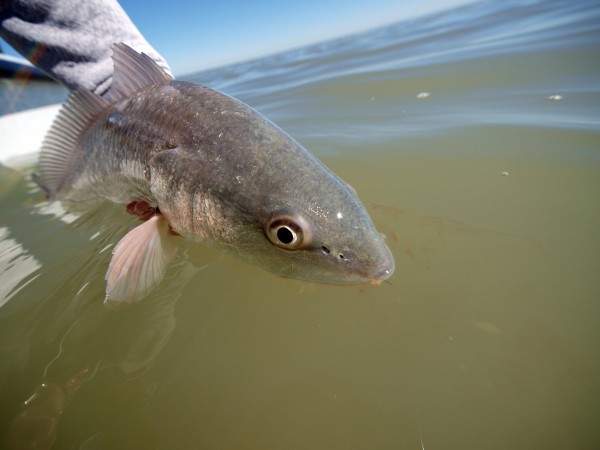
She missed the next fish. And the next. Time passed. Her eyes did not leave the water until she came tight to her second fish of the morning.
Another short interval and Nicki had wrestled a third redfish boatside.
I had not caught a fish since October and I was beginning to get itchy. Nicki released the redfish, the blue peak of its tail carving above the waterline as it swam off, and stepped back onto the platform.
I asked if I could occupy the high ground for a while. She smiled at me.
“Not yet.”
*
One of my socks had blown off the gunnel during my submergent release of the redfish. What slight wind there was must have carried it overboard after me. It pinwheeled slowly off the bow. Fifteen feet away. I picked up the 8 weight and rolled the fly, blinded in both eyes during its calamitous intersection with maw of the redfish, after the green wad of cotton. A shake had settled into my hands. I missed the sock the four times before I managed to find it with the hook.
“You cold,” asked Tejera.
“No.”
And I wasn’t.
Tejera was smiling. He had already resumed scanning what lay before us.
“I told you there were big fish in here.”
I stepped back onto the platform. The Seadek slick under foot where it met the oleic residue of bottom mire still clinging to the pads of my feet.
“Yeah. No shit.”
He started pushing us back onto the line we’d been taking across the flat.
“Wanna do it again?”
I was stripping line back onto the deck, navigating the coils of floating line behind the platform.
“Yeah. That’d be fuckin’ great.”
“Okay. Whenever you’re ready.”
I lifted my eyes back to Tejera.
“Take your time.”
Another overslot redfish was tracking across the bow. Moving counterclockwise from eleven. Slowly. The first shot preceded the fish by a little less than a foot. Strip. Strip. Nothing. I picked the line up from the water and shot again. Leading the fish. I let the fly drop a few inches more before starting it. Strip. Strip. Nothing. The fish stayed his course and carried on out of sight.
The next fish was laid up. Facing left to right. My first and second casts nearly hit the fish in the face. Zero response. I led the fish with the third cast in attempt to awaken something reflexive in the fish. To force him to eat. Nothing. For good measure I lined the fish with my last cast. Just to ascertain how deep her meditative state was. Mud ballooned out of the grass and I had my answer.
We came across another four or five fish. All in excess of the 27″ mark. I made a couple bad casts. Got the head of the fly line too close to one fish. Landed the fly too far beyond another. However, I also made casts that should have resulted in the fly getting flushed into and destroyed by the pharyngeal teeth of a double-digit redfish. We even changed the fly out. Four more shots garnered the same result, save one fish that made a half-hearted attempt to eat. I was tight to her for an instant, but I don’t think she ever had the hook. I’d had enough.
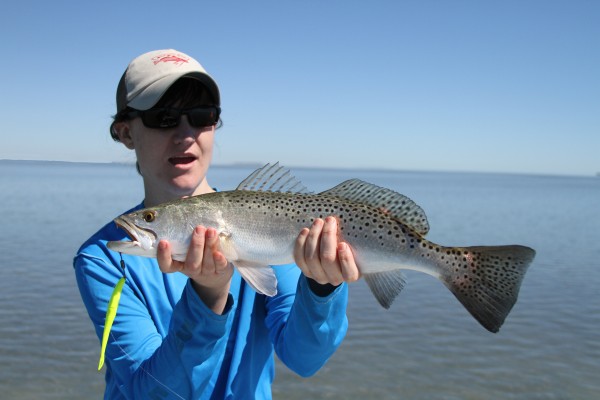
Nicki took the bow and was quick to put the moves on a solid trout that was creeping around the deep end of a pothole. We were hopeful that the trout rising from the shallow depression to inhale the jerkbait just below the surface was an indication that the redfish would also be developing a little bit more of an appetite.We were progressing slowly across the flat, but it didn’t take long to find. In twenty minutes time Nicki had back-to-back shots at laid up, well overslot redfish and another fish that we saw tailing from 200 feet out. Tail perpendicular to the tide and out near the edge of the flat, the fish stayed twerking away, tail wagging above the water, even as the jerkbait crawling trough the grass and right over the nares of the fish. Twice. Refused. Refused. Refused.
Refused. This word gets kicked around angling colloquia the world over and with great frequency. What anglers are referring to when using that word, refused, I suppose, is most often a question of semantics. For some, audience probably also dictates a great deal what they are actually talking about. Just because an offering is in the water at the same time that one sees a fish, and doesn’t hook said fish, does not mean the fish was in refusal. The fly was twenty feet away. From the tail of the fish. That’s a shitty cast. Not a refusal. Much in the same way that simply seeing a fish nearby does not mean that one had “a shot” on the fish. For others its more clear-cut. As it was for us. Each and every one of those fish saw the flies. The jerkbait. The presentations were made inside of a foot each time. They had no choice but to see them. All were patterns, good patterns, some new and others that had produced in the past. And those fish refused them all. They sat there. Watched the flies come in. Felt the hardwired and irrevocable chemical urge to chase and kill prey ignite in them. Only to ignore it and remain unmoved. With whatever internal monologue they possess, running somewhere between a fuck that and a fuck you.
Bear in mind, the refusals of which I speak say nothing of those fish that will turn on and track a fly for ten, fifteen feet only to turn away uninterested. That’s not a refusal. That’s a fucking abomination.
*
What remained of that first day found us tucked behind shorelines, working in the lee of a wind blowing a hard twenty knots out of the east. In an effort to allay frustration the fly rod was stowed beneath the gunnel as we trailed after pods of outrageously spooky snook and trout and the occasional cruising redfish. While the we fish found were plentiful, we saw very little of them beyond the racing of their shadows and swirling mud, as they would not let us within a hundred feet of them before charging further up the flat. Only clouds of silt and profanity left in their wake.
We kept at them with the spinning rods. Sailing jerkbaits far downrange we managed a snook and few more trout as the stark afternoon light foundered all around us.
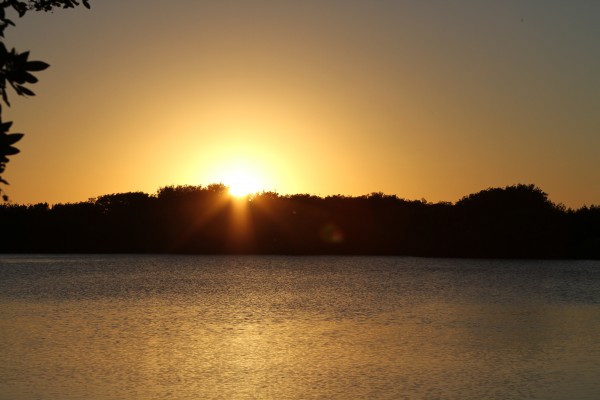
By the time we admitted that the fish we’d been in pursuit of were beyond catchable, and that the marina made more sense for us, the gold of sunset and the black silhouettes of the distant mangrove acreage had already begun their population of the west.
*
The following morning we arrived in Flamingo to find the perpetual flux of the world had come to a halt. A hush lay over everything. Nothing moved save a pair of early risen tourists shuffling across the blanched macadam towards the ship store. Two other fisherman were readying their their skiff at the top of the ramp. Their clipped speech and hushed tones, unencumbered by swirling air or the inexorable din of nature in its pacings, were betrayed. The small voices, the secrets of the days plan playing plain and clear across the calm.
We readied in near silence. Only the pop of truck doors. The near inaudible whine of hatch covers. We committed the skiff to the water and Tejera turned the engine over. The unintelligible speech of the outboard like voices obscured by doors and distance at some secret meeting. Small puffs of blue exhaust swirled over the cockpit. A discordant ambrosia, the petrolic miasma at once candied and acrid. How many mornings had begun this way? Combustion in the air, a welcome signifier of the journey to come. The possibilities.
Tejera nosed the skiff out of the marina and turned south into the channel. What we had left behind the day prior was gone. The wind-driven water that had warped the fine seam of horizon where the earth was zippered to the sky had settled. Reminder that nature will work in straight lines when given the chance. Even clouds had vanished. No pale, somas above to obscure the sun and drag the bloated carcasses of their shadows across the tide. Tejera eased the throttle to the top of its range. The deep mechanical cantillation of the engine unfettered by wind rolled away in every direction in long, low bellows. There was no sting of the still-too-cold-for-tarpon temperature, even as Tejera’s Hell’s Bay touched forty miles an hour. Just a minor chill in the manufactured wind.
As we came off plane the warmth of the broken day returned to us quickly. For a time, as we poled deeper onto that first flat, played on by the gentle suck of water at the pushpole as it worked, it seemed as though the immobility of the morning might last. That all three of us would be forced to catch at our breath the day long, lest that minute disruption of our breathing cause that perfect calm to fracture.
It did not take us long to reclaim the schools of fish we had attempted the day before. Though not as spooky as the prior afternoon the snook and redfish we came upon at that early hour remained evasive. Not charging off altogether, but riding a line that kept them just out of casting range.
Pushing deeper onto the flat, we began to encounter groups of more even-tempered fish. First to oblige my fly was a well freckled sea trout waiting motionless along the fringe of the seagrass where it met a long sweep of sand. The trout inanimate until the fly was nearly upon it. The quick flare of its jaws.
Further down the flat a half-dozen spot on presentations of the fly to two different redfish resulted in little more than bashful turn of the the eyes for one and another outright refusal from the other. Some time later I managed to feed a redfish that charged up from the grass to inspire the fly as slid it past. He would have proved to find the upper end of the slot, but a too quick strip set pulled the fly clear before the hook point was able to find flesh on which to bite. Harder to shrug off those missteps when the fishing is tough. And despite the creativity that generally informs post-missed fish profanity, sometimes screaming fuck at the top of ones vocal range is the most cathartic. You just hope its enough. And that there’s a another shot coming your way.
With frustration mounting Tejera made eyes with a redfish moving parallel to us at a distance of sixty feet and coming in. Small patches of cloud had begun to build south of us. The knolls of shredded white riding a rail above us as they worked their way inland. I shot the line and the fly came out of the loop and fell to the late side of nine o’clock just as the fish, a feet out from making contact with the fly, swam into a small lake of glare that turned the water to mirrorglass and swallowed his shape whole. I made one slow, sliding strip to where I thought the fish would be.
“Good. Don’t strip.”
With more purchase on the glare from atop the poling platform Tejera would have to call in the fly.
“Strip. Strip. Don’t move it. Don’t strip.”
The fly reduced by the glare to little more than pink incision.
“Now. Strip.”
At the second strip the redfish turned to the chug the fly in a flash of silvered head and shoulders. A push of water and the small whorl of pink and chartreuse vanished. I stripped hard once more and the fish shot off towards the stern. Fly line chasing along behind him.
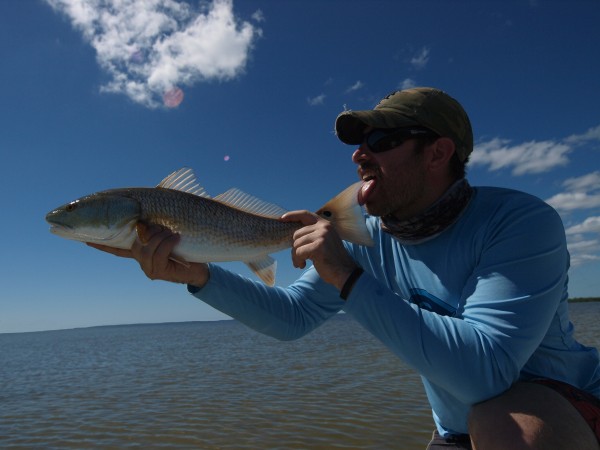
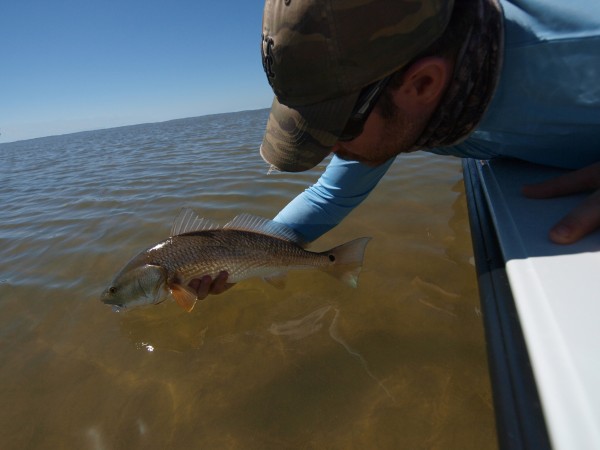
It took almost a day, but we finally managed to bring another redfish boatside by way of the long rod. And upon releasing the fish it was with no small amount of hesitation that I relinquished the bow to Nicki. After all though, fair is fair.
Pods of snook cloaked entire by their natural camouflage where they hunkered in the grass and mud began to spook before us and charge off in the direction from which we’d come. Another fifty yards further up the flat and we hadn’t seen much more save another group of snook moving back towards our point of origin. Tejera got us turned and we went after the fish. We came upon the snook as they crawled along nearly at the edge of the flat. The color of their backs shifting from pale green to grey as they moved amongst the small dunes carved by the tide. Initially the fish stayed out of range and almost out of sight as they worked away from us along the fringes of another encroaching sheet of glare. Tejera slowed us down and we came creeping along behind the fish until a brace of linesiders came into range at eleven o’clock. He called the fish and Nicki sent the paddletail after them. The lead fish wheeled on the bait. Nicki came tight to the fish. On the hook set he shot off towards the next flat. Spooking another pod of four or five snook as it ran.
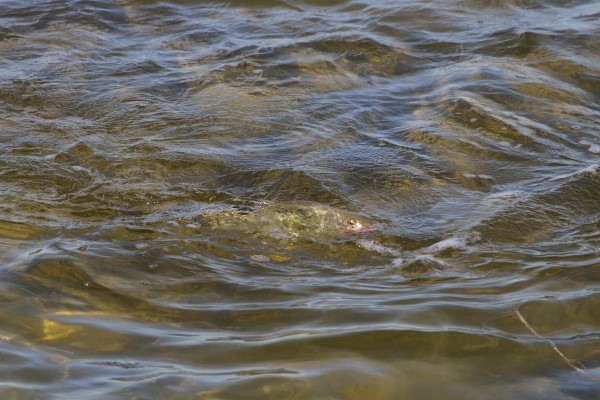
Nicki released the snook and we worked awhile longer at putting the hook into a second fish, but the pods of snook we had seen moving into the area had dispersed and continued further up onto the flat. After another twenty minutes of searching and finding neither shape nor sign of them, Tejera started poling us forward in search of new fish.
The wind had begun to come up. Though was still well below the gusting we had dealt with the previous afternoon, it was blowing enough. A long tract of mangrove shoreline that we had tucked behind severed the small blow down to a breath that pushed the water into a uniform plane over the stretch of flat that Tejera was poling us across. The first fish that Tejera called was coming up from behind us. He’d seen the redfish peel out from beneath the rafts of seagrass chaff shoved up against the shoreline by the tide. Nicki turned and picked the fish up as it broke from its track parallel to shoreline and started working counterclockwise towards the bow from three o’clock.
“Got him. Right there,” she said. Her rod tip outstretched.
“Wait for your shot. Not yet.”
Nicki flipped the bail. The braid draped across her fingertip. She turned with the redfish and as it neared twelve o’clock she let her cast go, leading the fish.
“Reel, reel, reel,” whispered Tejera from the platform.
Nicki angled the rod tip left as she retrieved, adjusting the bias of the bait as it swam. The redfish held its course.
The yellow ovoid of the fish’s eye bloomed just beneath the meniscus of pushing water. Scaled mandibles reaching and flashing silver. The choke of water surging across its gill rakers. Tail-whipped foam bubbling at the surface. The single tine of the spinning reel drag pinging against the rotor teeth and playing its lone, marvelous note as the redfish ran and thrashed.
There are few things I can recall that proved more rewarding than watching Nicki, who less than two years ago had never touched a piece of fishing equipment in earnest, and could barely cast to points of the clock, sight that redfish, be patient with her cast, execute the right presentation, and ultimately feed it as it came swimming across the bow.
It was impressive and beautiful to see. And indicative of the fact that her learning curve becomes less and less steep every time that she steps on to a skiff. And that I must bide my time wisely, as before long things on the bow are going to start to become rather competitive. I can’t wait.
*
We fished out the remainder of that shoreline and were afforded shots at another pair of redfish that spooked at the sight of the jerkbait and a snook wholly uninterested in a handful of presentations of the fly before we moved on. By now the wind had swung back around to the east and was picking up speed.
Tejera was poling us through a section of section of deeper water that bridged the distance between the flat we were leaving and the next flat that we would fish next when we saw head wake. The fish was charging hard from the deep recesses of the flat towards the open water we currently occupied. The broad shoulders and wide, flat shovel of its foreskull dissecting the nervous bightwater and casting a wide Isoscelean slipstream of slick water behind it. I stepped out of the cockpit and onto the platform and started peeling line from the reel onto the deck. Tejera swung the bow of skiff towards the fish. It would be a forehand shot that would fall somewhere between ten and eleven o’clock. As I let the first cast go the snook geared down short of the fly and settled above a pothole. Its shape a black scourge suspended above the white gape. The steep of its forehead visible. Fins stained with tannins and almost red beneath the sun. Orange pectoral fins winding like hummingbird wings as the fish made a slow 180 degree turn to face the direction from which it had come. I stripped the fly all the way back to the boat and reset. A tougher shot now, over the right shoulder of the fish. Sixty five feet. My second cast was going to fall on target. As the loop unfurled the fish tipped left and away from the fly. She wasn’t going to see it. I brought the fly all the way back and reset for a third cast. The snook was facing away from us. We waited for the fish to turn again. Adrenaline heat flooded my hands and face. The snook began to turn back to the right. Even with all of her three feet lit up by the sun the snook still looked black. I took the shot and the fly found its mark. Strip. Strip. The snook turned on the fly and went rigid. Its fins spurred. I stripped again. The fly bounced inches before the jaws of the snook.
After the snook looked off the fly I made two more half-hearted casts after her as she pushed out of the pothole and away towards the deep middle of the flat and the reaching seagrass.
Our plan had been to spend the afternoon searching out tarpon in the hope that afternoon temperatures would warm the day and get those early fish moving around and hungry, but with the wind blowing harder still and the chill it carried preventing the temperatures from creeping any higher than the mid-sixties, it seemed that it would prove a futile search and little else. Tarpon would have to wait until tomorrow. So, we stayed with our game. The only slight alteration to which would be trying to exact some sort of revenge on a larger than average snook .
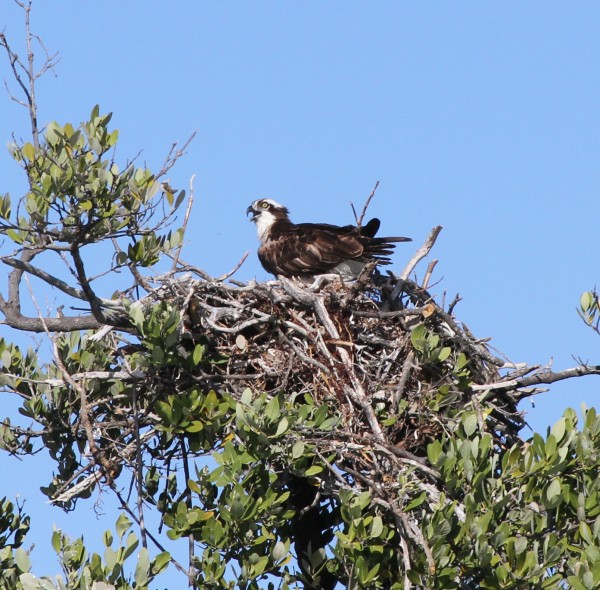
We covered quite a bite of Florida Bay trying to suss out another big snook. Cruising. Laid up. Or otherwise. With areas that we wanted to search already too wind-blown to allow for the discovery of any fish that might have been holding on those wind-whipped flats, we were relegated to working behind shorelines and in other more sequestered areas. While this isn’t necessarily a bad thing, it certainly hindered our efforts and cut our search area down quite a bit. In the end, the heavyweight snook were able to elude us. Although we found plenty of sheepshead unwilling to eat our baitfish patterns, a redfish that I was able to feed before promptly pulling the hook, and an osprey that would not stop screaming at us.
*
How insane the idea of Earth in the round must have been. No great leap of the imagination is required to conceive of how early seafarers would have believed the world flat. Stare off at the perfect divide between sea and sky and it is made relatively plain. The waters tabled out, stretching off to the limits of the world and beyond towards eternity. The flat pan of coastline left behind mirroring the hydrous design onto which they would set sail. Vessels in small silhouette against the horizon flirting with edge of what was known and their own destruction.
Though some did not mind the risk. They ventured on, beyond one horizon and another and another, perhaps a bit uneasy, at the prospect that they very well might have met their end and fallen, literally, from the face of the Earth. But, it paid off. And those willing to brave the chance of their own demise found us on a globe and not a flat circle. Their stories were told and their names were praised. The world was forever changed and the world rejoiced.
As we spun the bow west in search of tarpon on that our third and final day, knowing full well that nothing was at stake and the world beyond the gunnels of that skiff would be uncaring and oblivious if we managed bring a tarpon to hand, I couldn’t help share a bit of that unease towards what lay ahead that I imagine flooded the decks of early galleons.
The air was still cold. The water was still cold. And the water had been made dirty by the afternoon gales of the previous two days.
Tejera began to throttle up. He looked over at me.
“You ready?”
Out there the vast umber basin of the Gulf still and unbroken to the horizon where it kissed the colorless ether. Foundation of a sky coloring by small degrees. The blue reaching up, up, up.
“Fuck it. Let’s go.”
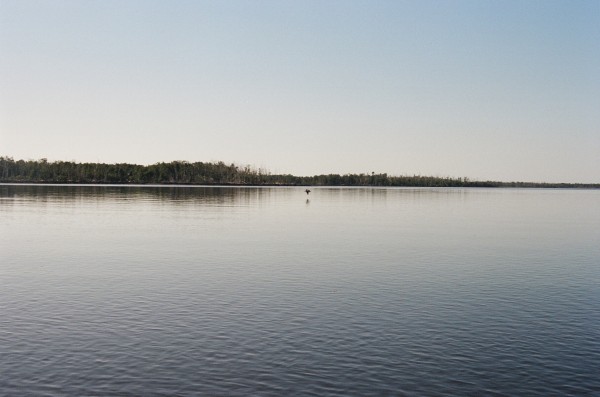
Tejera steered along the coast. The black plinth of mud and oysters, daily in its revelation before the withering tide, upon which the bleached cadavers of storm slain pines stood, canted still to the attitude of their first uprooting, smelled of salt and decay. The faint cloying quality of eroding biotic matter heavy in the windless morning. Pelicans and other fowl flew low in their transit towards their rookeries high above beach heads before which the tide stirred and trembled. We ran on. Into the coastal interior. The mangrove walls of the creeks we ran through coming apart and smearing into a pale green blur before our eyes. Lodes of mud humped above the swirling, soiled waters along the edges of the countless oxbows were shellacked with glare and glowing beneath the sun. Further still.
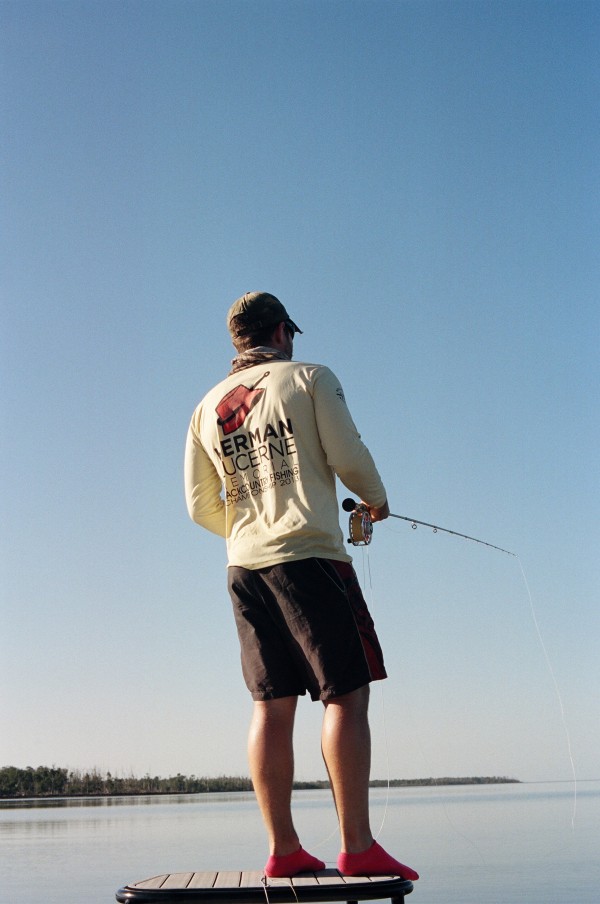
It is no secret that requisite to the game to which we had conscripted ourselves that morning are patience and time. Tithings to be paid without hesitation or regret. As Tejera pushed us into a small basin where we would begin our search, I played line from the reel onto the foredeck, inspected the fly for error and took the casting platform. I prepared myself to offer up that which must be ceded by all who engage in tarpon fishing. And we began our wait. Variegated sheets of riffled water and tiny maelstroms driven out of the tide moved beneath the bow. All of us were silent. Our eyes fixed on the water as they sought out a sign or shape that would tell of silver.
It doesn’t take long for the mind to wander in this situation.
There is a remarkable poet named Stephen Dunn. And many years ago he wrote a remarkable poem called Loneliness. It begins with a kind of lamentation over the single, imprecise word that the english language has left us with to describe a feeling rife complication and longing, while Inuit has provided the Eskimo’s with two dozen and then some words solely for snow. As the poem continues though, it seems that the lack of extra words specific to the depth and darkness of this aspect of the human condition is in fact a boon. For in the absence of more words for loneliness Dunn is able to find greater depth in telling the tale of that emotion than any single word or words devised solely to communicate the felling of loneliness ever could.
This poem was in my mind quite a bit as we pushed along waiting for a flash. A rolling fish. The steely upper fork of a tail wobbling as it sank back beneath the black water. For just as the lonely are left with but a single word to reference their affliction, so too are fisherman left with but a word. Every heartbreak, triumph, disappointment and desperation. All the casts, eats, storms, favorite fish, great fish, caught fish, and lost fish perpetually shoehorned into two syllables. Fishing. And here we are. Burdened with the futile task to fill by way of words shared in bars or skiffs or pages the enormous hole of experience and feeling left by that one vague word.
And just as there are Eskimo’s in their white sanctums wishing for the snow to just fall and accumulate, so are there fisherman wrapped in sunlight beneath the blue vault, thinking just let them swim, let them swim. Sometimes it’s easier that way.
We tarpon fished for six hours. Five days before there were enough tarpon around that it would have been work to not find them. And two days after my return to New York, Tejera would hook a half-dozen and land four. All before noon.
We saw four fish that morning. All at distance. We never even made a cast.
*
By the time we arrived back in Flamingo the wind had again come up and was blowing in excess of twenty miles per hour. The sun had fallen from its zenith and begun its western descent. Glare was more or less general across the surface of the water. Undeterred by our tarpon failure we continued on into Florida Bay in search of redfish and a chance to salvage what remained of the day.
Tejera started poling us onto the flat and we were in fish almost immediately. However, feeding one of the snook or redfish blowing out from beneath and next to us would not prove an easy task. The only corridor of visibility that we were able to obtain lay between eleven and twelve o’clock. And to get it, Tejera had pole us directly into the wind. For an added degree of difficulty we were without a stripping mat or bucket.
The first few fish that Tejera called remained completely hidden from me beneath the glare. I never had eyes on them until the skiff had nearly ridden over them. Even at that point the fish were wearing such a pale camouflage that distinguishing them from the turtlegrass and underlying sand was challenge enough.
We worked slowly up the flat and eventually better opportunities availed themselves. I was able to lay down a pair of casts, frustration and multiple attempts not withstanding, on a pair of fish that did not want to eat and third that moved to follow the fly, but never committed. Another fifty yards down the flat and Tejera called a fish at twelve thirty. It took a long pair of beats for me to find the fish. Through the glare. The windchop. Laid up and facing us, the redfish was at a difficult angle for a forehand shot, and with the wind barreling across the bow a backhand shot would carried the line directly into my body.
Tejera pushed hard on the pole and tipped the bow towards the fish. My first cast was blown off before the fly could even begin to turn over. I stripped line back in as fast as I could in attempt to get reset for another cast. Behind me, Nicki had put her spinning rod aside and was gathering my line from the windswept deck and depositing it into the safety of the cockpit. The fish had picked up and was moving towards us. I got off a second cast that fell wide of the mark. The fish was still coming. Call it pressure, call it wind, call it whatever, but twenty-five feet isn’t much of a cast, and the last loop I threw at that fish was hardest one I’d thrown in three days. The fly landed a few feet short of the redfish.
I let the small black baitfish pattern settle. And settle. When the redfish came within inches of the fly I had only to bump the line. The fish shot its jaws and pinned the fly to grass.
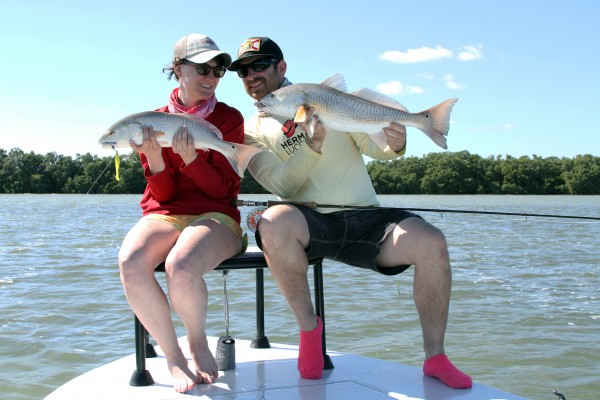
Line cleared from the cockpit and the fish was quick to the reel. As it ran away from the bow and made for the middle of the flat, a second redfish was driven out of the grass. It wheeled on the fish I’d hooked and gave chase. It didn’t take but a moment for the chartreuse shad tail Nicki had been throwing to arc out towards the end of the my fly line. The new fish swallowed the shad tail as it slid over the back the hooked fish without ever breaking its pace.
It was the first redfish double that Nicki and I had attempted and it was a successful one at that. More importantly though, it was teamwork that put the hooks in both those fish. It never would have a happened without Tejera, Nicki, and I all being on the same page at the same time and knowing what to do. I know it’s a bit of a contrivance to extol the importance of teamwork in fishing when conditions aren’t ideal, but fuck it. It’s the truth. You can’t catch them if you don’t work together. And not catching fish when it’s tough is bad for the heart.
We released the fish together and they each moved off towards different parts of the flat. Tejera was sitting behind the console. He tipped his head back and stared off to the west towards the lowering sun. He checked his watch.
“Should we keep fishing or pack it in?”
Tejera and I smiled at each other and Nicki stepped back up on the casting platform.
We continued along on that flat another hour and the fishing only got more and more difficult. The wind blew harder and the light kept failing on us. The fish did not exist unless they happened to be in that small corridor of visibility we’d been working all afternoon. Unwilling to quit the bow, Nicki kept working and managed to bring a smaller snook to hand before her and Tejera paired up on the biggest snook we had seen in three days. I don’t know how either one of them saw the fish. I couldn’t make head or tail of the fish through the glare. A fact that seemed absurd when I finally got a look at her. It took Nicki four long casts across the wind to line the fish up. But she did. And when she steered the jerkbait over the eyes of the snook the eat was of the kind that gives one pause. Forces them to reconsider why they would want to do anything but fish. Whatever composure that fish had been able to maintain as it waited for food to swim by was surrendered in an instant. All of the three-plus feet of swimming flesh ordering up from the seagrass in a torrent of foam and spray as the snook crashed jerkbait on its way up. Its body entire clearing the water by a foot and pitch-poling as it fell back to the shallows. The pale skin of its underbelly caught the late sun and flared in bright white before it disappeared. The last gasp of a pulsar extinguishing.
Nicki was tight to the fish for a second, maybe two before the hook gave out. We were all quiet for a minute. Nicki spoke first as she stepped down from the platform.
“At least I saw him,” she said. “And I got him to eat.”
Nicki has been picking up the nuances of fishing little by little. And in fairly short order she has become a pretty good angler and she understands the mechanics of concepts of fishing. But until she came off the bow, shoulders a little slumped, eyes cast down, rolling the mangled catastrophe of the snook damaged jerkbait through her fingers, I don’t think she had ever understood the madness of it. When she looked back up, I could see it in her face. Now she knew.
Hooks pull. Leaders part. Knots break. We have far less control over these things than we would like to think. Yes, it is devastating when the fly falls from the lips of your first permit. But it can also fall from the lips of a ladyfish at boatside too. The physical laws of the universe hold sway over our terminal tackle and what happens to it and we do not. But those moments of sorrow and desolation, that’s not where it lives. That lunacy that makes us want to pry our eyes from their sockets, rip hair from our scalps, scream until our ears bleed, beat at the gelcoat until the flesh is torn from our fists, and resign small fortunes worth of fishing equipment to the brine. The mania lives in those short instants where control is still attainable. The cast. The presentation. And it lives in the chaotic flash point when that sentient being you’ve been so fixated on loses all control and erupts. That is where the madness dwells. That is fishing.
*
Perhaps most stalwart of all three of us was Tejera. We had fished hard for three long days and as we drove out of the Everglades National Park on that final day I saw him checking the rearview mirror. He checked his watch. The sun was low in the west and the vast plain of Everglades that lay behind us had already begun to cool. Stripped of the last floes of sunset, the sawgrass verges were turning blue and domes of crowding slash pine islanded in the distance were consumed with shadow.
“Let’s try and get that poon.”
We drove on a while longer and turned off the main park road. The february gloaming filled the small cove before us and the far shore seemed as though it might combust where the burning sun threatened to touch the peak of the mangrove canopy.
Tejera and I each pulled a rod from beneath the gunnel and stood by at the water’s edge waiting for a tarpon to show. We spent a moment remembering those times we’d stood there before and where we’d seen tarpon rolling on those evenings past. We waited. A tarpon finally rolled and Tejera fired a long cast after the fish. It never ate.
We stayed a while longer casting to cover as much water as the surrounding shrubbery would allow. We saw one more tarpon roll, way off in the slick where the water shifted and burned beneath the fading sun, but we never caught one.
As we pulled back onto the park road, Nicki was first to break the silence.
“I can’t believe this,” she said. “I’m tired. I’m hungry. And all I wanna do is drink a beer and take a shower. But I can’t stop thinking about fishing.”
Who could?
***
As always huge thanks go out to Capt. Steven Tejera for making this trip happen. In the last year I have fished more difficult days than easy days with him, but we always find a way to catch fish. It would be hard not to, as his knowledge of ENP and the fish that swim those waters from Islamorada to Chokoloskee is remarkable and it far, far exceeds his age. He is tireless and exacting in his pursuit of them and his dedication to catching fish never once falls anywhere short of his utmost. Most importantly though, he has fun while he’s doing it. It’s a total pleasure to fish with him. I highly recommend it. Call him, don’t call him. Do you whatever you want. It’s your life, man.
And of course big thanks are due to Nicki Manchisi for catching a bunch of fish and for her help behind the camera. Without her, none of my posts would look as good as they do. Seriously.
She’s also a hell of a filmmaker.
Fishing in the northeast should begin heating up in the next month or so as this dog shit weather that has been general the winter the long begins lose ground to a very much anticipated spring. And this year I plan to throughly explore more of the excellent fisheries that exist in close proximity to NYC. First, early spring shad, and then back to the salt for the striped bass and bluefish that move north during the summer. And in late May there’s also the possibility of a little New Mexico trout fishing too. How it all plays out remains to be seen, but regardless I’m sure that I’ll have a story or two to tell.
Until then, you can find me posing around the Internets.
-Baz

